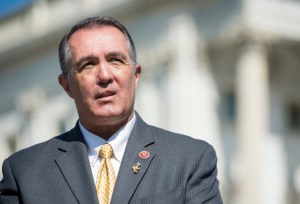
Roll Call:
In a potentially momentous departure from longstanding law, the fiscal 2017 defense policy bill Congress will send President Barack Obama in the coming days would expand the aims of America’s strategic missile-defense policy.
In 1999, Washington enacted a law that expressed the purpose of U.S. defenses against intercontinental ballistic missiles as “limited.” The concern then was that endorsing a more expansive system would lead to fielding of an unnecessarily costly shield and would confirm fears in Russia and China that incipient U.S. antimissile systems were aimed at taking out those nations’ nuclear deterrents.
Now, the new defense policy measure will remove the word “limited” and replace it with the word “robust.”
Trent Franks, R-Ariz., the House’s main advocate for making the change, said in a statement to CQ Roll Call that he is “deeply encouraged” by the conference outcome.
“This signals a clear, bipartisan shift in how Congress thinks about Missile Defense, and it will allow the U.S. to close the growing capability gap rather than lagging behind the missile threat,” Franks said. “Furthermore, the American people rightly reject the notion that we can rely on Mutually Assured Destruction to deter irrational rogue states from developing and deploying nuclear weapons and the means to use them.”
But arms control groups consider the change in language worrisome. They worry that Russia and China will read the change as confirmation of their fears about the threat America’s antimissile systems pose to Moscow and Beijing — and those fears, in turn, could lead to a cycle of military action and reaction.
The defense authorization conference report appears to attempt to allay such fears. “The conferees note, nothing in this legislative provision requires or directs the development of missile defenses against any country or its strategic nuclear forces.”
But critics still believe the change will be potentially destabilizing.
Stephen Young, a senior analyst at the Union of Concerned Scientists, called the policy revision a “serious mistake.”
Young told CQ it would “send a signal to Russia and China that the United States is not interested in strategic stability, but is focused instead on pursuing military options that could easily provoke reactions that will ultimately harm U.S. security.”
Kingston Reif, a defense expert with the Arms Control Association, also warned that the arcane change in policy language could have real-world effects.
